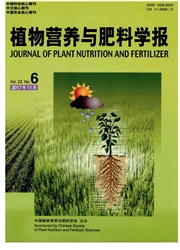

 中文摘要:
中文摘要:
以安徽郎溪耕地红壤耕层土壤为对象,采用室内恒温培养方法,研究了CO(NH2)2、(NH4)2SO4及NH4HCO33种氮肥在不同施用量条件下对土壤硝化作用及酸化过程的影响。结果表明,对照处理土壤的净硝化速率为(NO2-+NO3-)-N 25.7μmol/(kg·d);3种化学氮肥添加到土壤后均显著促进了土壤的硝化作用,CO(NH2)2、NH4HCO3处理土壤的净硝化速率分别为(NO2-+NO3-)-N 51.3~189.6、50.7~149.9μmol/(kg·d),且净硝化速率随氮肥用量增加而增加;(NH4)2SO4处理土壤的净硝化速率为(NO2-+NO3-)-N 60.5~107.9μmol/(kg·d),以施用量N 150 mg/kg时最大。研究同时发现,3种化学氮肥均导致土壤pH下降,CO(NH2)2、NH4HCO3处理土壤pH较对照处理分别下降0.11~0.43、0.02~0.36个pH单位,氮肥施用越多,pH值下降越大;(NH4)2SO4处理土壤pH较对照处理下降0.08~0.26个pH单位,以施用量N 150 mg/kg时下降最大,N 300 mg/kg时下降最小。统计分析表明,土壤pH与土壤中(NO2-+NO3-)-N含量呈极显著负相关,土壤酸化速率与净硝化速率有显著的线性相关关系,说明氮肥通过硝化作用影响土壤酸度。
 英文摘要:
英文摘要:
An Ultisol from cropland in Anhui province in subtropical China was used to study the effects of urea,ammonium sulfate [(NH4)2SO4] and ammonium bicarbonate(NH4HCO3) on nitrification and acidification of the soil with incubation experiments.Nitrification increased significantly with nitrogen fertilizers added.The net nitrification rate of the control soil was(NO-2+NO-3)-N 25.7 μmol/(kg·d),the corresponding figures were(NO-2+NO-3)-N 51.3-189.6,50.7-149.9 and 60.5-107.9 μmol/(kg·d) for the treatments with urea,NH4HCO3 and(NH4)2SO4 added,respectively.Greater addition of urea and NH4HCO3 led to a more increase in net nitrification rate;however,the highest net nitrification rate occurred when N 150 mg/kg soil was added for(NH4)2SO4 treatment.Meanwhile,soil pH decreased by 0.11-0.43,0.02-0.36 and 0.08-0.26 pH units for the treatments of urea,NH4HCO3 and(NH4)2SO4 compared with the control,respectively.There was a significant negative correlation between the soil pH and the content of(NO-2+NO-3)-N.Soil acidification rate was also linearly correlated with nitrification rate,confirming that nitrification in soil was the main cause for accelerating acidification of the Ultisol.
 同期刊论文项目
同期刊论文项目
 同项目期刊论文
同项目期刊论文
 Coordination nature of aluminum (oxy)hydroxides formed under the influence of low molecular weight o
Coordination nature of aluminum (oxy)hydroxides formed under the influence of low molecular weight o Effects of Amorphous Al(OH)(3) on the Desorption of Ca2+, Mg2+, and Na+ from Soils and Minerals As R
Effects of Amorphous Al(OH)(3) on the Desorption of Ca2+, Mg2+, and Na+ from Soils and Minerals As R 期刊信息
期刊信息
